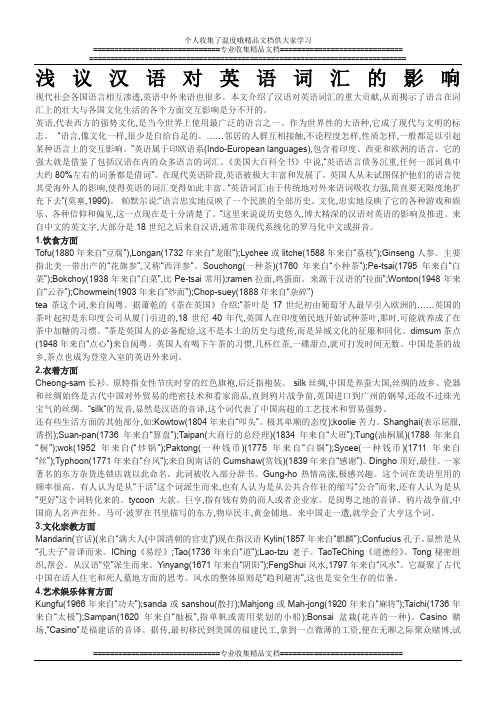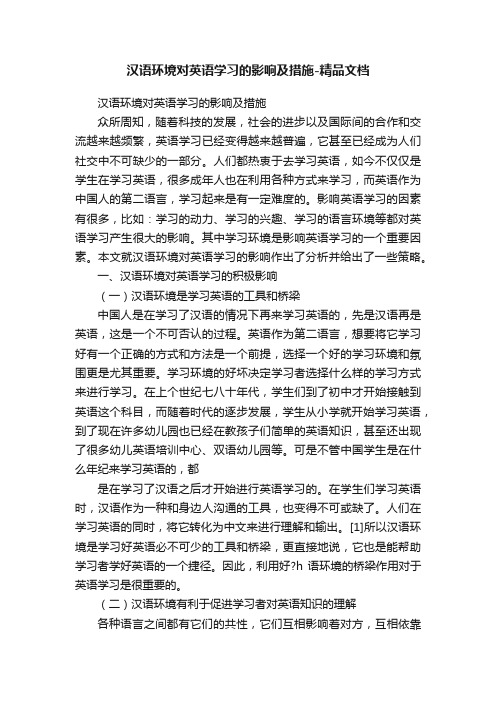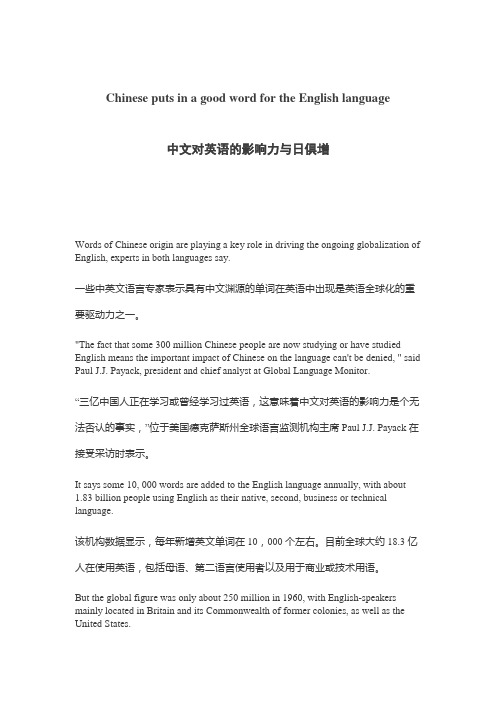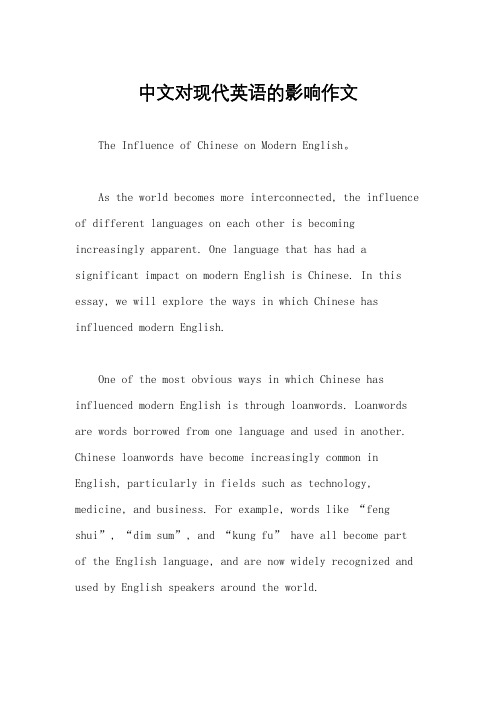中文对英语的影响(English)
汉语对英语学习的影响

汉语对英语学习的影响汉语是世界上最古老的书面文字之一,也是最广泛使用的语言之一。
汉语在国际上的影响力越来越大,使得学习汉语成为一个热门的选项。
对于学习英语的人来说,学习汉语并不仅仅是为了了解中国文化和交流,它还对英语学习本身有很多积极的影响。
汉语对英语学习者的语言学习能力有很大的帮助。
汉语有一个完全不同的语法系统,学习者需要理解和使用不同的语法规则和结构。
这种语法学习的挑战能够锻炼学习者的思维,提高他们对语言的逻辑和结构的理解能力。
这对于学习英语这样一种语法结构相对简单的语言来说是非常有帮助的。
学习汉语可以提高学习者的词汇量。
汉语是一种非常丰富的语言,有成千上万的汉字和词汇。
学习者需要努力记忆和使用这些字词,这对于他们在学习英语时同样有很大的好处。
通过学习汉语,学习者可以学习到很多英语中没有的词汇,拓宽他们的词汇量和表达能力。
学习汉语可以提高学习者的听力和口语能力。
汉语是一种声调语言,学习者需要正确地发音和运用不同的声调才能够被人理解。
这对于他们提高英语的听力和口语能力非常有帮助。
通过学习汉语,学习者可以训练自己对声音的敏感度和准确度,从而提高他们对英语的听力理解和口语表达。
学习汉语可以增加学习者对不同文化和传统的理解。
汉语是中国的主要语言,学习者通过学习汉语可以了解中国文化和传统。
这对于他们理解中国人民和中国社会的思维方式和价值观是非常重要的。
学习者还可以通过学习汉语了解中国的历史、地理、经济等多个方面,进一步拓宽他们的知识面。
汉语对英语学习有很多积极的影响。
它可以提高学习者的语言学习能力、词汇量、听力和口语能力,并且拓宽他们对不同文化和传统的理解。
学习汉语不仅仅是为了了解中国文化和交流,对于学习英语本身也是非常有帮助的。
浅议汉语对英语词汇的影响

浅议汉语对英语词汇的影响现代社会各国语言相互渗透,英语中外来语也很多。
本文介绍了汉语对英语词汇的重大贡献,从而揭示了语言在词汇上的壮大与各国文化生活的各个方面交互影响是分不开的。
英语,代表西方的强势文化,是当今世界上使用最广泛的语言之一。
作为世界性的大语种,它成了现代与文明的标志。
“语言,像文化一样,很少是自给自足的。
……邻居的人群互相接触,不论程度怎样,性质怎样,一般都足以引起某种语言上的交互影响。
”英语属于印欧语系(Indo-European languages),包含着印度、西亚和欧洲的语言。
它的强大就是借鉴了包括汉语在内的众多语言的词汇。
《美国大百科全书》中说,“英语语言债务沉重,任何一部词典中大约80%左右的词条都是借词”。
在现代英语阶段,英语被极大丰富和发展了。
英国人从未试图保护他们的语言使其受海外人的影响,使得英语的词汇变得如此丰富。
“英语词汇由于传统地对外来语词吸收力强,简直要无限度地扩充下去”(莫塞,1990)。
帕默尔说:“语言忠实地反映了一个民族的全部历史、文化,忠实地反映了它的各种游戏和娱乐、各种信仰和偏见,这一点现在是十分清楚了。
”这里来说说历史悠久,博大精深的汉语对英语的影响及推进。
来自中文的英文字,大部分是18世纪之后来自汉语,通常非现代系统化的罗马化中文或拼音。
1.饮食方面Tofu(1880年来自“豆腐”),Longan(1732年来自“龙眼”);Lychee或litche(1588年来自“荔枝”);Ginseng人参。
主要指北美一带出产的“花旗参”,又称“西洋参”。
Souchong(一种茶)(1760年来自“小种茶”);Pe-tsai(1795年来自“白菜”);Bokchoy(1938年来自“白菜”,比Pe-tsai常用);ramen拉面,鸡蛋面。
来源于汉语的“拉面”;Wonton(1948年来自“云吞”);Chowmein(1903年来自“炒面”);Chop-suey(1888年来自“杂碎”)tea茶这个词,来自闽粤。
汉语对英语学习的影响

汉语对英语学习的影响汉语是世界上使用最广泛的语言之一,也是全球第一人口大国的正式语言。
随着中国国际地位的日益提升,越来越多的人开始学习汉语。
对于那些英语母语者来说,学习汉语能够带来很多好处,以下是对汉语对英语学习的影响的一些探讨。
首先,汉语是另一种语言和文化的精华,可以开阔我们的视野,增强我们的多元文化认知。
汉语从语言学、音韵学、语音学、语法等方面都与英语有很大的不同,通过学习汉语可以帮助我们理解其他语言的语法和词汇。
汉语词汇的多样性使我们有更多的方式去描述和表达决定人类生活方方面面的事物。
此外,学习汉语也可以让我们更深入地了解中国人的思维方式和文化背景,从而更好地吸收中国政治、经济和文化方面的新闻信息。
其次,学习汉语可以提高多任务处理和翻译技能。
学习汉语不仅要掌握汉语语法、词汇和发音,同时也需要训练我们的听力、口语、阅读和写作技能。
这些技能都可以帮助我们更好地理解其他语言中的语法、词汇和表达方式。
当我们熟练掌握汉语后,我们能够更容易地区分不同的语言特点,从而更好地理解其他语言。
在跨语言交流中,我们也能更好地理解他人的意思,提高我们的多任务处理和翻译能力。
第三,学习汉语可以帮助我们更深入地了解中国市场和商业文化。
中国是世界上最大的市场之一,无论是在贸易还是在投资领域中,了解中国的商业文化都是非常重要的。
学习汉语可以帮助我们更好地了解中国的商业风俗和文化习惯,进而更好地理解中国和全球商业市场的联系。
学习汉语也可以增进在国际商务上的沟通和交流,帮助我们更为顺利地谈判、交流并达成商业合作。
最后,学习汉语可以带来一些语言学习方面的优势。
汉语的发音和语法结构都比较规范,相对来说学习难度较小。
汉语中有很多词汇都与英语词源相同或相近,例如“红茶”、“功夫”、“太极拳”、“算盘”等,这些相似的词汇可以让我们更快地掌握汉语。
此外,汉语的汉字书写也具有一定的美感和艺术价值,通过学习汉字,我们可以进一步了解汉字和汉字文化在中国和世界文化中的地位和影响。
汉语对英语学习的影响

汉语对英语学习的影响汉语是世界上最古老的语言之一,它具有丰富的历史和文化底蕴。
在当今世界,汉语已经成为了世界上使用人数最多的语言之一。
而随着中国在国际舞台上的崛起,汉语的重要性也越来越被重视。
越来越多的人开始学习汉语,而学习汉语对于英语母语者来说也产生了一定的影响。
学习汉语可以拓展英语学习者的视野。
汉语是一门非常复杂而且独特的语言,它使用汉字作为其书写系统,而且拥有自己独特的语法和语音规则。
学习汉语不仅可以让英语学习者更加深入地了解其它语言的结构和规则,还可以使他们更加深入地理解汉语文化和历史。
这种全新的学习经历可以让英语学习者拓展自己的视野,从而有更加宽广的思维空间,使其在英语学习中更加得心应手。
学习汉语也可以提高英语学习者的语言能力。
汉语是一门非常古老而且庞大的语言,它拥有非常丰富的词汇量和独特的表达方式。
学习汉语可以让英语学习者更加灵活地运用自己的语言能力,因为他们可以从汉语中汲取一些新鲜而且独特的语言元素。
这些元素可以丰富英语学习者的语言储备,使其在英语学习过程中更加得心应手。
学习汉语还可以提高英语学习者的语言学习能力,因为学习一门非常不同的语言需要英语学习者更加深入地思考和分析,这可以提高他们的语言学习能力,让其在英语学习的道路上更加得心应手。
学习汉语也可以促进英语学习者的文化交流。
由于中国在世界上的地位日益提高,越来越多的外国人开始学习汉语并对中国文化产生兴趣。
学习汉语可以让英语学习者更加深入地了解中国文化,从而与中国人进行更加深入的交流。
这种文化交流可以让英语学习者更加深入地了解中国人的思维方式和生活习惯,从而更好地融入中国人的生活中。
这种交流也可以促进大家之间的友谊和合作,从而为国际文化交流搭建了更加坚实的桥梁。
学习汉语也可以为英语学习者提供更多的就业机会。
由于中国在国际上的地位日益提高,越来越多的企业开始在中国开展业务,并对会说汉语的人才产生了浓厚的兴趣。
学习汉语可以为英语学习者提供更多的就业机会,因为他们可以为那些在中国开展业务的企业提供翻译和商务咨询等服务。
汉语对英语学习的影响

汉语对英语学习的影响
学习汉语可以使英语学习者更深入地了解汉字和古代汉语文化。
汉字是中国文化的象征,而且汉字在英语中的使用也颇为常见。
许多英语学习者常常会迷恋于汉字的美丽和神秘,因此学习汉字可以使他们更加深入地了解中国文化,从而更好地理解和使用英语中的汉字。
学习汉语可以增加英语学习者对语言的灵活运用和应用的认知。
中文和英文的词汇和语法结构存在一些相似之处,但也存在一些截然不同的地方。
学习汉语可以帮助英语学习者培养灵活运用语言的能力,更好地理解和表达英语中的语法结构和词汇,从而提高英语表达的准确性和适用性。
学习汉语可以拓展英语学习者的语言视野和跨文化交际能力。
汉语是世界上最古老、最广泛使用的语言之一,而且中国作为世界上最大的国家之一,其文化和历史对世界产生了深远的影响。
学习汉语可以使英语学习者更好地了解中国的历史、文化和社会,从而更好地与中国人交流和沟通,增加自己的跨文化交际能力。
然后,学习汉语可以帮助英语学习者拓展就业机会和职业发展。
随着中国经济的快速发展,越来越多的跨国公司和机构开始在中国投资和发展。
精通汉语的英语学习者在职业生涯中将会具有很大的竞争优势,他们可以在跨国公司、教育机构、外交部门等领域找到更多的就业机会。
汉语对英语学习者的影响是多方面的。
学习汉语不仅可以帮助英语学习者更好地理解汉字和中国文化,还可以帮助他们拓展语言视野和跨文化交际能力,增加就业机会和职业发展,并且可以使他们更加尊重和理解不同的语言和文化。
我们应该鼓励更多的人学习汉语,让更多的人受益于汉语对英语学习的积极影响。
汉语词汇对英语语言的影响及其机制分析论文

汉语词汇对英语语言的影响及其机制分析论文汉语词汇属于较为多元化的体系,其重要是通过词汇、言文、词语、词意、词音等组成的演变系统、分布空间系统、交叉系统、层级系统、延展系统、组合系统、生成系统以及构成系统等。
多元化的汉语词汇,其构成主要由汉语的内部原因和外部原因共同作用产生的结果,能够体现出汉语的特征以及语言的共性,并且影响这英语语言文化。
针对汉语词汇影响英语语言文化的具体情况进行研究,对语言发展起来很大的推动作用。
一、汉语词汇对英语语言的影响表现1.汉语丰富的词汇促使英语词汇数量的增多。
随着汉语影响力的不断提高,英语受到汉语的影响也日益增大。
在英语词汇方面,源源不断的汉语词汇被大量引用,一些中式英语也逐渐被英语所接受,被纳入英语语言中的一种表达习惯。
汉语对英语的影响越来越大,汉语词汇成为英语新词汇的主要来源之一。
英语是国际通用语言之一,在国际上的地位不言而喻。
由于西方发达国家经济的快速发展,英语全球化已是共识,越来越多的中国人学习英语,而英语也是大学、中学和小学的必修课程。
伴随着中国的改革开放和进入世界贸易组织,学习英语已经成为一种潮流。
越来越多的中国人学习英语。
由于中国和英国文化存在着很大的差异,无法用原有的英语词汇表达具有中国特色的事物和文化现象,为了完成沟通交流的目的,人们尝试运用具有具有中国特色的词汇进行交流,很多中国式的英语变成了英语的新词汇,丰富了英语的词汇。
例如drink tea,就是老外直接广东话中的“饮茶”,而long time no see就是从中国的“好久不见”直译。
由于中国式的英语表达方式简练实用,所以被广泛实用,并且已经进入主流英语,成为英语的新的词汇。
2.汉语悠久历史对英语语言文化的影响。
语言能将民族的文化、全部历史、偏见、各种信仰、娱乐、游戏等全面加以反应,英语文化中的汉语词汇,主要是以拼音或者罗马化中文为主的非现代系统化进行呈现。
在中国古代,随着中国丝绸之路的不断发展,丝绸被出口到西方国家,当时的英语中并没有“丝绸”这个单词,于是便根据丝绸的做工精细,用“silk”表示丝绸。
论汉语对英语词汇的影响(英文版)

A research on how Chinese impact on English vocabularyLi LongAbstract:With the development of C hina’s national strength, Chinese is more and more popular in English-speaking countries. As a result, a lot of new English words were created. Why Chinese can influence English vocabulary and in what way does it influence English are my topic.Key words: reasons, new English words, Chinese, influenceEnglish has borrowed words from more than fifty languages in the course of its development. There are a large number of English words that borrowed from Greek, Latin and French. Nowadays, another powerful language is exerting a profound influence on English vocabulary. That is our mother tongue, Chinese. The article tries to undertake at this point shallow wanted analysis and evaluation.Reasons why Chinese can influences English V ocabularyEnglish belongs to the Low West Germanic branch of the Indo-European family. In ancient time, it is rather difficult for Chinese to influence English vocabulary. But now, thanks to economic globalization, Chinese is increasing the number of new English words.1.The development of C hina’s national strength.With the development of economy, china’s international status has enhanced a lot. Chinese is more and more used in different areas such as international trade, politics and so on. An increasing number of English speakers are getting used to Chinglish. For example, “one country two system” is such a new English word which means “一国两制” in Chinese.2. The uniqueness of Chinese.China has an extensive history, spanning several thousands of years. A lot of ancient Chinese is difficult to be translated into English. So a lot of proper nouns are created. Such as Confucianism(儒家思想),Four Books(四书) and Five Classics(五经).3. A worldwide fever in learning Chinese.As Chinese is becoming a popular subject, people want learn more abo ut present-day china through the learning Chinese. English needs to adopt new words to meet the needs of situation. For instance, “Confucius Institute”.The way Chinese impact on English vocabularyThe new English words that are created by Chinese relate to various aspects of life. Chinglish is more and more popular in English-speaking countries.1.DietChinese food culture is extensive and profound. Foreigners love Chinese food. So there are many English words about Chinese food. The most typical one is “tofu”. What’s more, Kung Pao Chicken(宫保鸡丁),Buddha skipping wall(佛跳墙) and large meatball(狮子头) are the newest English words.2.PoliticsChina is a socialist country. We have China-specific aspect system of government. So a lot of new English words have been created to indicate Chinese politics. For instance, three represents theory(三个代表),peaceful rising(和平崛起),family contract responsibility system(家庭联产承包责任制)and the four modernizations(四个现代化)。
汉语对英语学习的影响

汉语对英语学习的影响汉语对英语学习的影响体现在语言结构上。
中国学生在学习英语时,由于母语的影响,会在语言结构上产生一些偏差。
在英语中,形容词一般位于名词之前,而在汉语中则是相反的顺序。
学生可能会出现将形容词放在错误的位置的情况。
英语的词序也与汉语有所不同,这也会导致学生在表达句子时出现困难。
汉语对英语学习者在语言结构方面的影响是显而易见的。
汉语对英语词汇的学习也有着重要的影响。
由于英语和汉语属于不同的语系,它们的词汇有着很大的差异。
在学习英语时,学生需要大量地掌握英语的词汇,而在这个过程中,汉语可能会成为一种“障碍”。
由于两种语言的词汇没有太多的重叠部分,学生需要大量地进行词汇的背诵和记忆。
由于中文与英文的发音、拼写和含义的不同,学习者在学习英语的过程中可能会遇到一些困难和挑战。
除了语言结构和词汇之外,汉语对英语语音和语调的影响也是不可忽视的。
由于中文与英文的语音系统和语调有所不同,因此学生在学习英语的过程中,可能会受到汉语语音和语调的影响,导致发音不准确和语调不自然。
中文中的四声和英文中的语音调型有着显著的区别,这对学生的英语口语表达和听力理解都会产生影响。
汉语对英语语音和语调的影响是十分重要的。
汉语对英语学习者的文化背景影响也是值得关注的。
中国拥有悠久的历史和灿烂的文化,这对学生在学习英语的过程中也会产生影响。
中国学生在学习英语时可能会受到汉语文化的影响,导致在英语学习中出现一些文化差异带来的障碍。
在英语学习中,也需要了解英语背后的文化内涵,这就需要学生具备一定的跨文化交际能力。
在英语学习过程中,汉语对学生的文化素养也有着一定的影响。
尽管汉语对英语学习会带来一些影响,但我们也可以通过一些方法来更好地利用汉语促进英语学习。
学生可以通过语言对比的方法来帮助自己更好地掌握英语。
通过比较两种语言之间的差异和相似之处,可以帮助学生更好地掌握英语的语言结构和词汇。
学生可以通过大量的阅读和语言实践来提升自己的英语能力。
中文的思维方式对英文学习的影响(外研版英语)

中文的思维方式对英文学习的影响(外研版英语)Content一. The atmosphere for second languages study1. The background of English.English is the main international language in the world. From 17th century, the influence of British Empire has been greater and greater. With the extend of the Great Britain and achieved its unique status English has been popular in the area of politics, economy and military. When we entered the 20th century, the status of the Great Britain has been weakened, but English has still been popular and accepted by more and more people. After the Second World War, America has been the superpower in virtue of its economy, politics and military. The voice of America absolutely has been the keynote of the world. Due to the history affairs and the reality, the status of English not only be consolidated, but also be enhanced.2. The actuality of English learning.English is an international language, or the world communication tool. According to an international organization, now the English learners are about 700 million to 800 million. Besides the native English speakers (about 300 million to 400 million), others are learning English in different degrees. Whether the data is true or not, we can be sure of one thing, the English learning is being calefactive, more and more Chinese being learning English.3. The differences between first language learning and second language learning.As we all know, from the day we come to the earth, we live in a certain language circumstance. Before we learn a certainlanguage, we have been edified for a long time. A baby first called “mom”, which marks the start of his language learning, after that, he will express his ideas by the corresponding. At the age of 4 or 5, kids can easily use the language which they live in. That is called first language or mother tongue. For everyone, mother tongue is lifelong wealth.Different people have different ways. For some, they may use their mother tongue as the only tool. For others, they should acknowledge more than one language, that is, besides mother tongue, another one is a must. For The second language learning, different country has different status. For example, the situation that people learn English as a second language in Canada and India is absolutely different. The former use English as a main tool to communicate, but the latter regard it only as the government use. It is not hard to see in China. In minority area, local people learn standard Chinese is the same case as a second language learning in India. All these cases are called Second Language Acquisition (SLA).Second language acquisition is not intended to contrast with foreign language acquisition. SLA is used as a general term that embraces untutored acquisition and tutored acquisition. It is, however, an open question whether the way in which acquisition proceeds in these different situations is the same or different○1. SLA is not a uniform and predicate phenomenon. There is no single way in which learners acquire knowledge of a second language. SLA is the product of many factors pertaining to the learner on the one hand and the learning situation on the other…different learners in different situations learn a L2 in different ways○2.One obvious difference between the young child and theadolescent or adult is the ability of the latter to comprehend language as a formal system. Older learners can learn about language by consciously studying linguistic rules. They can also apply these rules when they use the language. In contrast, younger children, while not totally lacking in meta-awareness, are not so prone to respond to language as form. For them language is a tool for expressing meaning.二. Chinese learn English.TEFL (teaching English as a foreign language) in China has a history of roughly one hundred years. Short as it may be, compared with the history of FLT in western countries, it is full of twists and turns.“Let the world know China, let China face the world”. After a long time of introspection, China actualized the open-up policy, which makes English be popular in China. The English learning trend has also promoted the education technology and other areas. The facility and means of English learning has changed. More and more foreign teachers are teaching in universities, even in middle schools. It is common to see that learners practice oral English and communicate with foreigners. After a long time of exploration in English learning, the reality that Chinese learn English in Chinese atmosphere has not changed, which lead Chinese learners to a barrier. As Professor Deni Xiong said, English learning is a battle, the enemy being your mother tongue, and the weapon is English.2.1 Chinese thinking pattern disturbance in English learning.The first language disturbance is natural in foreign language learning. The reason is that foreign language learning is to learn language knowledge, such as grammar, words, and its like, but not to contact and cognize the world again. This process was notstart from zero, but to adjust the information system and thinking pattern on the basis of the first language learning. However, the knowledge system and thinking system which deposit in the first language environment are rooted, which will reject the new language toughly.I think about a classmate in my junior school, who named Huang Shuren, being interested in English learning. One day, he made a self-introduction,“my name is Yellow Tree Man”. He checked the three words in the list, and put them together, which he thought could be his name. What an interesting experience, but it reflects a common phenomenon in English learning.2.2 The sound disturbance in English learning.When we start new language learning, there are some differences from the L1. At the beginning of English learning, you can not pronounce the long vowel or short vowel well, for example, mistakenly pronounce “by ship” to “by sheep”, which makes people confused, or mistakenly pronounce “he is thirty” to “he is dirty”. Perhaps you can not distinguish [r][l], so that falsely pronounce rice to lice, because you can not find [r] in your L1.2.3 The grammar disturbance in English learning.In grammar, you may have made mistakes like “I am student”, “it raining hard” or“he has went home”. You even felt con fused when you made a sentence “although…but…” Or, you asked the teacher again and again that why not use “I against his plan”.2.4 The words use disturbance in English learning.You may have this experience that when you talked in English Corner, introduc ing “my English is low” or “if you are convenient, please come at three o'clock”. All these sentencesare thought correctly by yourself. Even in English writing, you mistakenly use “go buy thing” instead of “go shopping”, “write with English” not “write in English” and you considered all sentences are fluent without errors. They are accepted by the new learners, but not the local speakers.2.5 Cultural disturbance in English learning.In order to speak English correctly, it is necessary to have a good knowledge of culture in western countries. The foreigners will be pressed with the sensitive questions, such as “how much money have you earned here in China?”, “are you married”. All these embarrassing situations are from cultural barrier. We new learners should have a good knowledge of the culture, as an old saying goes “do as the Romans do”.All of these problems are obvious and low level. At most time, it is unconscious when we are disturbed by the L1. According to a lecture by professor Zongyan Wang, he has investigated 30 writings by 20 students, in which he find about 150 disturbances by the L1, which deserves more consideration, because many of these writers have studied English more than 5 years, and some of them are translators or English teachers.Facing the interference of mother tongue we should not be discouraged. Not do we be frustrated when we face challenges. Only the one who can make full understanding of disturbances in English learning can improve his English, mastering his oral English learning processes and being familiar with English thinking patterns. We can not seriously demand ourselves catch those English speakers.三. Interlanguage and Chinglish.3.1 A glance of interlanguage.Like mastering other language, language learning is aprogressive, deeply and perfection course. Either native language acquisition or foreign language learning both have to go through a process. In foreign language learning, at the beginning learners is in the effort toward the ultimate goal and advance, that is, master the target language. In this process we try our best to express our ideas in English, but finally we disappointedly find that ability is not equal to the ambition. In other words, our English neither get rid of the influence of the native language, nor with the characteristics of the target language. This phenomenon is called interlanguage by Selinker in the early 1972.Interlanguage is constantly close to the target language by the native speakers, which is in essence of dynamic change process. Learners always actively enrich their knowledge of foreign languages system and, according to their own understanding to judge, repeatedly discarding and fixing. Interlanguage obeys certain rules and develops gradually, so it has its own principle. Foreign scholars have a point on interlanguage research: in a certain language environment, the same level learners’ approximate system is roughly the same. Learners alone differ in thousands ways, personal cognitive method and strategy also often vary widely, thus it has always hard been principled. Due to the different language environment, now there are new types of English, such as Hinglish, Japglish, Frenglish, Spanglish, which is with great space from pure English.3.2 The summarization of Chinglish.Chinglish is from two words “Chinese” and “English” clipping them together. We can not find the word in a dictionary, but it is not strange for us. From a foreign teacher, “Chinglish”has two meanings. One is that the inherent Chinese culture and ideology of generation has produced special Chinesepolitical terms, the popular view and words allusions, for example, “both red and expert”, “a three-merit student”, “one nation and two system”, “cross-street relations”, ect. We are very familiar with these sentences. Once we put them into English symbols, foreigners are often feeling puzzling and elusive. The second is that Chinese students use English to express their ideas, as the influence of the native language and the way of thinking, consciously or not, Chinglish being produced in oral and written on the wrong English usage.Domestic scholars have borrowed the formulation of professor Chuangui Ge, who is a master in the English field and professored in Fudan university, studying internal problem of English expression. To define “Chinese English” and “China English”, they pointed: “China English” is based on Standard English as the core, expressing Chinese unique social culture, not being subjected to interference with the native language. By transliteration or semantic regeneration, vocabulary, sentence or text with Chinese characteristics has been produced. “Chinese English” is that in China, due to the interference of mother tongue, users cover the Chinese rules and habits in English learning, which produced nonstandard and deformity English.It is hard to avoid the first kind between two languages with great differences in couture. However in oral English, we easily made a “Chinese English” mistake, which now is vividly explained by Chinglish.3.3 The form of Chinglish.More and more Chinese learn English, more and more Chinglish being produced. It is necessary to say some regards when Chinese students meet English teachers. “Have you had your breakfast?” “Where are you going?” These words soundright, but they made English speakers puzzled and embarrassed, because of English greeting habits. Another example, I heard a student make a phone call to a foreign teacher: “hello, I am Li.., who are you? I want to meet Jackson.” These are not fit with American phone habits. Some typical title such as “teacher Chan” makes English speakers uncomfortable. The oral Chinglish is just a speaking habit.Chinglish is more popular in written English. Now, the written English is much stricter than before, but the Chinglish in written English is particularly outstanding. There are three kinds of Chinglish, and one is English speaking on Chinese. Chinese students have a tendency that when they are speaking Chinese, they translate Chinese into English, based on Chinese sentence pattern. The process of translation process is different from person to person; if people made such sentences, no doubt, have went through the process. The next step is translation, being dead move and stack, putting every English word into the Chinese pattern. At last, here comes English with Chinese character. There are some examples:1) My English base is very poor and composition is always my weakness. I must make use of a strong measure to raise my English level all round. (我的以英语基础很差,写作一直是我的薄弱环节。
汉语环境对英语学习的影响及措施-精品文档

汉语环境对英语学习的影响及措施-精品文档汉语环境对英语学习的影响及措施众所周知,随着科技的发展,社会的进步以及国际间的合作和交流越来越频繁,英语学习已经变得越来越普遍,它甚至已经成为人们社交中不可缺少的一部分。
人们都热衷于去学习英语,如今不仅仅是学生在学习英语,很多成年人也在利用各种方式来学习,而英语作为中国人的第二语言,学习起来是有一定难度的。
影响英语学习的因素有很多,比如:学习的动力、学习的兴趣、学习的语言环境等都对英语学习产生很大的影响。
其中学习环境是影响英语学习的一个重要因素。
本文就汉语环境对英语学习的影响作出了分析并给出了一些策略。
一、汉语环境对英语学习的积极影响(一)汉语环境是学习英语的工具和桥梁中国人是在学习了汉语的情况下再来学习英语的,先是汉语再是英语,这是一个不可否认的过程。
英语作为第二语言,想要将它学习好有一个正确的方式和方法是一个前提,选择一个好的学习环境和氛围更是尤其重要。
学习环境的好坏决定学习者选择什么样的学习方式来进行学习。
在上个世纪七八十年代,学生们到了初中才开始接触到英语这个科目,而随着时代的逐步发展,学生从小学就开始学习英语,到了现在许多幼儿园也已经在教孩子们简单的英语知识,甚至还出现了很多幼儿英语培训中心、双语幼儿园等。
可是不管中国学生是在什么年纪来学习英语的,都是在学习了汉语之后才开始进行英语学习的。
在学生们学习英语时,汉语作为一种和身边人沟通的工具,也变得不可或缺了。
人们在学习英语的同时,将它转化为中文来进行理解和输出。
[1]所以汉语环境是学习好英语必不可少的工具和桥梁,更直接地说,它也是能帮助学习者学好英语的一个捷径。
因此,利用好?h 语环境的桥梁作用对于英语学习是很重要的。
(二)汉语环境有利于促进学习者对英语知识的理解各种语言之间都有它们的共性,它们互相影响着对方,互相依靠着对方。
在学习英语的过程中,学习者一定要善于利用汉语的各种规律来加强自身对英语的理解,从简单到复杂,都可以用汉语来将它解释成自身所能理解的文字。
Chinese puts in a good word for the English language 中文对英语的影响力与日俱增

Chinese puts in a good word for the English language中文对英语的影响力与日俱增Words of Chinese origin are playing a key role in driving the ongoing globalization of English, experts in both languages say.一些中英文语言专家表示具有中文渊源的单词在英语中出现是英语全球化的重要驱动力之一。
"The fact that some 300 million Chinese people are now studying or have studied English means the important impact of Chinese on the language can't be denied, " said Paul J.J. Payack, president and chief analyst at Global Language Monitor.“三亿中国人正在学习或曾经学习过英语,这意味着中文对英语的影响力是个无法否认的事实,”位于美国德克萨斯州全球语言监测机构主席Paul J.J. Payack在接受采访时表示。
It says some 10, 000 words are added to the English language annually, with about 1.83 billion people using English as their native, second, business or technical language.该机构数据显示,每年新增英文单词在10,000个左右。
目前全球大约18.3亿人在使用英语,包括母语、第二语言使用者以及用于商业或技术用语。
中文对现代英语的影响作文

中文对现代英语的影响作文The Influence of Chinese on Modern English。
As the world becomes more interconnected, the influence of different languages on each other is becoming increasingly apparent. One language that has had a significant impact on modern English is Chinese. In this essay, we will explore the ways in which Chinese has influenced modern English.One of the most obvious ways in which Chinese has influenced modern English is through loanwords. Loanwords are words borrowed from one language and used in another. Chinese loanwords have become increasingly common in English, particularly in fields such as technology, medicine, and business. For example, words like “feng shui”, “dim sum”, and “kung fu” have all become part of the English language, and are now widely recognized and used by English speakers around the world.Another way in which Chinese has influenced modern English is through the use of Chinese characters. While English does not use Chinese characters as its writing system, Chinese characters are often used in English to represent certain concepts or ideas. For example, the symbol for “yin and yang” is often used to represent balance or harmony, while the character for “qi” is used to represent life force or energy.Chinese has also influenced modern English in terms of grammar and syntax. Chinese grammar is very different from English grammar, and this has led to some interesting changes in the way English is spoken and written. For example, Chinese does not have a tense system like English does, so Chinese speakers often struggle with English verb tenses. This has led to the development of new grammatical constructions in English, such as the use of the present participle to indicate ongoing actions (e.g. “I am walking”).Finally, Chinese culture has had a significant impact on modern English. Chinese culture is rich and diverse, andhas influenced everything from art and literature to philosophy and religion. Many English speakers are now familiar with concepts like Taoism, Confucianism, and Buddhism, and have incorporated these ideas into their own lives and worldviews.In conclusion, the influence of Chinese on modern English is significant and far-reaching. From loanwords and characters to grammar and culture, Chinese has left its mark on the English language in a variety of ways. As the world continues to become more interconnected, it is likely that this influence will only continue to grow and evolvein the years to come.。
汉语对英语学习的影响

汉语对英语学习的影响随着全球化的发展,英语已经成为世界上最重要的语言之一。
而对于非英语国家的学习者来说,他们的母语对于学习英语也有着重要的影响。
在中国,汉语是学生们的母语,因此汉语对英语学习有着深远的影响。
本文将探讨汉语对英语学习的影响,并从词汇、语法、语音和文化等方面进行分析。
汉语对英语学习的影响体现在词汇方面。
由于汉语和英语属于不同语系的语言,因此两者之间的词汇没有直接的关联性。
在词汇学习的过程中,汉语学习者常常会受到母语的影响,导致他们在英语学习中产生一些误解和错误。
汉语中的一些词汇在英语中并没有直接对应的词,因此学生往往会直译出现问题。
由于中英文化的差异,一些文化内涵丰富的词汇也会难以准确理解和运用。
在英语学习中,学生需要通过大量的阅读和学习,逐渐培养对英语词汇的敏感度和准确理解。
汉语对英语学习的影响还体现在语法方面。
汉语和英语的语法结构有很大的不同,这对汉语学习者在学习英语的过程中造成了一定的困惑。
汉语的语序是主语+谓语+宾语的形式,而英语的语序是主谓宾的形式,这就需要学生在学习英语时适应不同的语言结构。
英语中的时态、语态、情态动词等语法现象在汉语中并没有直接对应,因此也需要学生进行比较和反复训练,才能掌握和运用得当。
这就要求学生在学习英语时要注重对语法知识的细致学习和深入理解,尤其要注重语境和实际运用。
汉语对英语学习的影响还表现在语音和发音方面。
作为汉语母语者,学生在学习英语发音时常常受到母语的影响,导致发音不准确或者有口音。
英语中的元音、辅音和连读等现象在汉语中并没有直接对应,因此学生需要进行大量的反复训练和模仿,才能逐渐掌握英语的发音规律和技巧。
由于发音是语言表达的基础,因此汉语学生在学习英语时,要注重对音标和发音的细致学习和实际训练,才能达到纯正的英语发音水平。
汉语对英语学习的影响还体现在文化方面。
汉语和英语所处的文化环境和社会背景有很大的不同,这就需要学生在学习英语的过程中,逐渐了解和理解英语国家的文化和风俗习惯。
普通话对英语口语的影响

普通话对英语口语的影响【摘要】当前,普通话和英语口语成为人们交流的重要工具。
本文通过实验研究和理论研究来说明普通话对英语口语客观上存在着影响,进而说明普通话对英语口语的影响既有正面的,也有负面的。
普通话对英语口语的影响主要表现在语音方面。
最后说明如何利用普通话对英语口语的影响来学习普通话和英语口语。
【关键词】普通话英语口语正面影响负面影响一、引言有这样一个现象:班级普通话讲得好的学生,英语口语特别是语音发面掌握得很不错;相反,普通话水平不高甚至带着浓重乡音的学生,口语相对来说比较糟糕。
比如说,四川人说英语时,[m uz]听起来往往是[l uz ]。
北方人因为在很多时候讲汉语时不分/v/和/w/,所以部分北方人错误地将L字母/v/说成/w/。
究竟是什么原因呢?普通话和英语口语之间一定存在密切的关系。
带着疑问,我查阅了一些研究资料。
二、普通话对英语口语的影响是客观存在的(一)实验研究1.河南轻工业学院的王友良等多次研究测试发现,家住城市的学生,普通话水平明显高于来自农村的学生,其英语口语也好于这些来自农村的学生。
原因在于生活在城市的学生通过广泛接触广播,电视等媒体有较多的学习普通话的机会,在这种文化的有声语言的刺激下,他们听辩能力的准确性和敏感性加强。
在语言交流中能有效排除汉语方言的干扰,规范自己的普通话发音,使其普通语言能力得到不断提高。
这种较强的听辩语言能力在第二语言{英语}习得过程中,能够使他们有意或无意地克服汉语方言的制约,因此他们在学习语音时难度就小一些,在良好的语音能力基础上,口语水平就提高得快多了。
相反,在农村长大的学生长期处于单一方言环境中,缺乏其他语音系统的刺激,其听辩能力较差,缺乏对不同语音系统的敏感性,同时发音器官也因长期使用同一发言而产生一种定势,在模仿其他语音系统时就会产生严重的干扰,因此普通语言能力的发展就客观地受到限制。
这种汉语方言的干扰同样会产生在学习英语的过程中。
2.河北科技师范学院的张艳莲,石建炜,孙颖等研究英语口语教学过程中,以汉语专业本科学生60人为一个实验班,在实验两年后对这些实验对象的普通话与英语口语等级(三级)测试成绩进行了对比分析(下表)。
汉语对英语学习的影响

汉语对英语学习的影响汉语作为世界上最古老、最特殊、最受欢迎的语言之一,已经影响着全球人口达到近15亿人。
在现代科技和经济的发展下,中国已成为世界领先的超级大国,相应地,汉语的影响也变得越来越深远,已经逐渐成为全球企业、国际政治、文化交流和学术研究的重要语言之一。
在英语作为全球第一语言的背景下,汉语对英语学习的影响也越来越显著。
首先,汉语对英语学生的语言思维能力有着积极的影响。
汉语是一种学习汉字、发音、语法和句式结构的语言,它的语法和结构与英语是不同的,这对于英语学生而言是一种挑战和机会。
汉语的学习可以帮助学生培养语言思维能力,因为汉语的语法和句子结构对于英语学生来说比英语更加复杂。
例如,汉语语法中的多种动词和形容词形式,及其用法,要比英语要复杂得多。
当他们学会如何灵活地使用这些词汇和结构时,他们自然也会更加自信地使用英语。
其次,汉语的学习可以增加学生的语言学习动力和学习兴趣。
汉语是一种美妙的语言,它的发音、语调和汉字给人们留下了深刻的印象。
学生学习这种语言不仅可以给他们带来语言学习的成功的经验,也可以激发他们的学习兴趣,并且成为一种文化和历史的学习探究。
通过汉语学习,他们会接受到一些与英语不同的文化和历史背景,这将丰富他们对不同文化背景的理解,带来一个更广泛的世界视野。
最后,以汉语教师为例,他们的语言教学经验和教学技巧可以对英语的语言教学产生很大的影响。
汉语教师有着严密的教学体系和丰富的教学经验,在课堂上经常会引导学生进行语言沉浸式学习,这将使学生更容易掌握汉语的语音、语法和词汇。
当这种教学经验和技巧运用到英语教学中时,可以使英语学习成为更加有趣和丰富的体验,并且可以提高学生的语言水平和应用能力。
总之,汉语对英语学习的影响是多方面的,包括提高学生的语言思维能力和学习动力,增加他们的文化阅历和国际视野,并且提供了汉语教师的教学经验和教学技巧。
随着中文国际化的进程,汉语对英语学习的影响将变得越来越受重视。
汉语词汇对英语语言的影响及原因

创新教育科技创新导报 Science and Technology Innovation Herald172世界上现存的语言有几千种之多,但在实际的沟通和交流中,全球95%以上人口所使用的语言不过100种左右。
其中英语在世界语言综合影响力中的霸主地位是毋庸置疑的,虽然不同学者和专家基于不同角度,对汉语的排名有所争议,但在前10种语言中位居中上,在国际上得到了普遍认可。
正是由于汉语在国际语言中的重要地位,使得英语语言在发展过程中大量吸收和借用了汉语的语言特征。
尤其是在词汇层面上,从明代起英语就开始对来自汉语的外来词进行借用,并随着两种语言接触的不断增多,更多的音译、意译、半音半意译等汉语词汇被引入英语语言体系中去。
这些被英文化了的汉语词汇来源广泛,涉及政治、经济、文化、历史、习俗和饮食等众多领域,它们不仅形成了新的英语词汇,在很多时候更是改变了原有英文词汇的固有语义。
相关统计显示,《新牛津英语词典》大约收录了1 000多个与汉语相关的词汇,可见汉语文化对英语语言的影响颇深。
改革开放以来,随着中国融入世界的程度不断加深,越来越多的有中国特色的词汇被引入英语词汇系统中。
那么什么样的词汇会被英语收录,而英语借用汉语词汇的方式和特点有哪些,汉语对英语语言产生影响的具体成因是什么,这些都是文章所要分析和探讨的重点内容。
1 语言与文化的关系语言与文化的关系十分紧密,正是基于文化鲜明的地域性和民族性,人类才产生了大量的形式各异的语言体系。
首先语言作为文化的重要组成部分,它是人类在进化中所创造的宝贵的精神财富,也是文化发展的必然结果。
从生物学角度出发,人们从最初的通过模仿完成简单的沟通与交流,而当物质和精神文明积累到一定程度后,他们很难再依靠简单的模仿去实现对文化内容的准确表述,“语言”由此应运而生。
语言是文化传播准确性的有效保证,反之,文化也极大地推动和促成了语言的产生。
其次语言也是文化的客观反映,不同的语言能够反映不同民族的文化。
汉语对英语学习的影响

汉语对英语学习的影响汉语对英语学习的影响可以从多个方面来看。
汉语与英语是属于不同的语系,汉语属于汉藏语系,而英语属于印欧语系。
在学习英语时,汉语的语法和词汇与英语有很大差异,这也带来了一些挑战。
英语的语序一般是主语+谓语+宾语,而汉语的语序则较为灵活,这就需要英语学习者要花费一定的时间和精力去适应和理解。
汉语和英语在词汇方面也存在一定的差异。
虽然有部分英语单词与汉语有相似的拼写或发音,但它们的意思可能完全不同。
汉语中的“好吃”表示食物好吃,而英语中的“good appetite”意思是指有食欲。
英语学习者在词汇学习上要注意掌握词语的真实含义,以避免产生误解。
汉语的语言特点也会影响英语学习者对英语发音的学习。
汉语是一个以声调为特点的语言,不同的声调对于词语的意义起着很大的作用。
而英语则是一种以重音为特征的语言,重音的位置和强调程度对于意思有一定的影响。
英语学习者需要通过大量的听力训练和口语练习来熟悉和掌握英语的发音规律。
汉语的文化和传统也会对英语学习者产生一定的影响。
汉语是一个有着悠久历史和丰富文化的语言,学习者通过学习汉语可以更好地了解中国的文化和思维方式。
这对于理解和运用英语的文化内涵和表达方式是很有帮助的。
通过学习汉语,英语学习者可以更好地理解中国传统节日和习俗,有助于拓宽视野和加深对中国文化的了解。
汉语对于英语学习者的语言思维能力和学习能力也有一定的促进作用。
学习汉语需要学习者掌握一定的记忆技巧和学习策略,这对于英语学习者在学习英语的过程中也是很有帮助的。
学习汉语也可以培养学习者的观察能力和逻辑思维能力,这对于英语的学习和运用也会起到积极的影响。
汉语对英语学习的影响是多方面的。
它涉及到语法、词汇、发音、文化和思维方式等方面的差异和异同,既带来了一些挑战,同时也提供了更广阔的学习空间和拓宽视野的机会。
在学习英语的过程中,学习者需要充分利用好汉语对英语学习的促进作用,不断加强自己的学习能力和语言能力,以达到更好的学习效果。
浅议汉语对英语词汇的影响

浅议汉语对英语词汇的影响现代社会各国语言相互渗透,英语中外来语也很多。
本文介绍了汉语对英语词汇的重大贡献,从而揭示了语言在词汇上的壮大与各国文化生活的各个方面交互影响是分不开的。
标签:英语词汇;借词;文化;汉语英语,代表西方的强势文化,是当今世界上使用最广泛的语言之一。
作为世界性的大语种,它成了现代与文明的标志。
“语言,像文化一样,很少是自给自足的。
……邻居的人群互相接触,不论程度怎样,性质怎样,一般都足以引起某种语言上的交互影响。
”英语属于印欧语系(Indo-European languages),包含着印度、西亚和欧洲的语言。
它的强大就是借鉴了包括汉语在内的众多语言的词汇。
《美国大百科全书》中说,“英语语言债务沉重,任何一部词典中大约80%左右的词条都是借词”。
在现代英语阶段,英语被极大丰富和发展了。
英国人从未试图保护他们的语言使其受海外人的影响,使得英语的词汇变得如此丰富。
“英语词汇由于传统地对外来语词吸收力强,简直要无限度地扩充下去”(莫塞,1990)。
帕默尔说:“语言忠实地反映了一个民族的全部历史、文化,忠实地反映了它的各种游戏和娱乐、各种信仰和偏见,这一点现在是十分清楚了。
”这里来说说历史悠久,博大精深的汉语对英语的影响及推进。
来自中文的英文字,大部分是18世纪之后来自汉语,通常非现代系统化的罗马化中文或拼音。
1.饮食方面Tofu(1880年来自“豆腐”),Longan(1732年来自“龙眼”);Lychee或litche(1588年来自“荔枝”);Ginseng人参。
主要指北美一带出产的“花旗参”,又称“西洋参”。
Souchong(一种茶)(1760年来自“小种茶”);Pe-tsai(1795年来自“白菜”);Bokchoy(1938年来自“白菜”,比Pe-tsai常用);ramen拉面,鸡蛋面。
来源于汉语的“拉面”;Wonton(1948年来自“云吞”);Chowmein(1903年来自“炒面”);Chop-suey(1888年来自“杂碎”)tea茶这个词,来自闽粤。
- 1、下载文档前请自行甄别文档内容的完整性,平台不提供额外的编辑、内容补充、找答案等附加服务。
- 2、"仅部分预览"的文档,不可在线预览部分如存在完整性等问题,可反馈申请退款(可完整预览的文档不适用该条件!)。
- 3、如文档侵犯您的权益,请联系客服反馈,我们会尽快为您处理(人工客服工作时间:9:00-18:30)。
09110616 Title : The effects Chinese has on English
As a consequence of globalization, English , as an international language has been greatly influenced by other languages, especial by Chinese .
——"Hi, long time no see!"
——"how are you ?"
——"I'm good!"
... ...
We can hear this very often in our daily life, and in some formal occasion, even in some Hollywood films. Obviously, it is a Chinese way of saying hello to others, it reflects the way we our Chinese think, and our codes of language. Chinese has effects on English in many respects, ranges from eating ,life to learning ,working. There are many words can improve it.
Won ton, Tofu Lychee or litche, tea, Chop-suey etc. All those words listed above are fruits and dishes native to Chinese or invented in Chinese .Of course the words come from Chinese.
Then, come to the life. Kowtow , TaiChi , Kung fu, confucianism those are signal of Chinese tradition , as with Chinese culture ,they sail to far away and blossoming all over the world.
At last, in respect of learning and working. The first proverb I can say in English is "Good,good study ,day day up." I use to thought it was a wrong saying . But ,now many native speaker also say so. The words first was said
by our Chairman Mao , while , it has become a famous byword in the world.
There are too many words to recount introduced from Chinese. So ,lwe can conclude that Chinese has a great effect on English ,and with the time flying ,the fluence will get bigger and bigger !。
